高三英语复习课件:Verb tenses (共29张PPT)
文档属性
| 名称 | 高三英语复习课件:Verb tenses (共29张PPT) |  | |
| 格式 | zip | ||
| 文件大小 | 823.2KB | ||
| 资源类型 | 教案 | ||
| 版本资源 | 通用版 | ||
| 科目 | 英语 | ||
| 更新时间 | 2018-05-28 09:08:29 | ||
图片预览

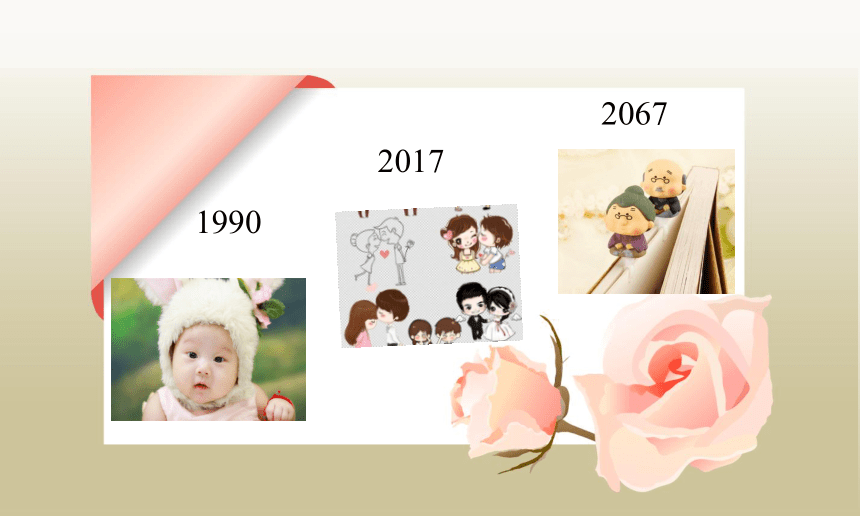
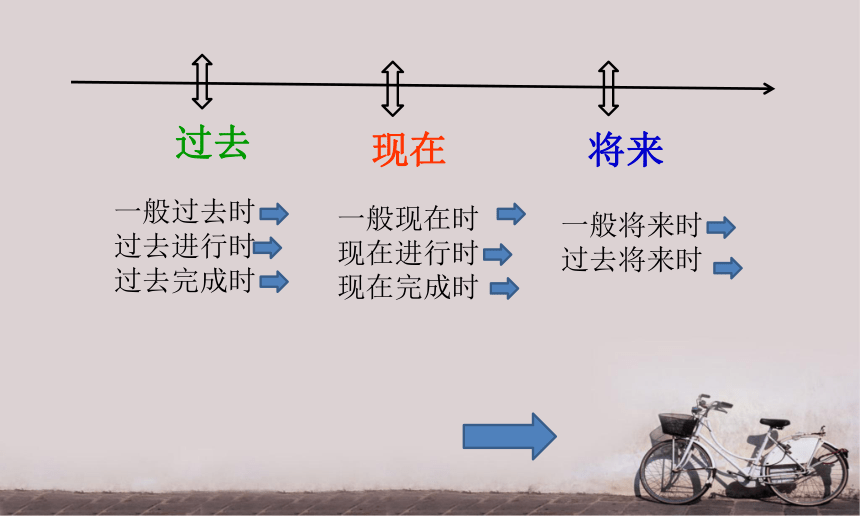
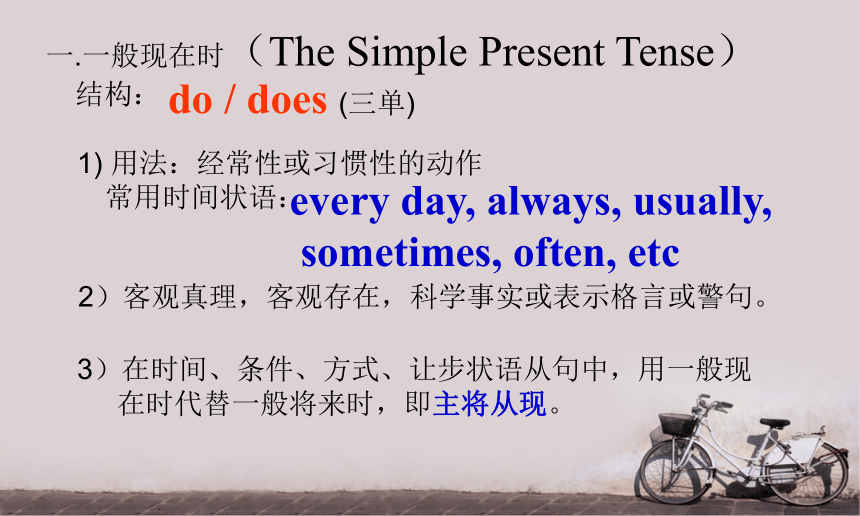
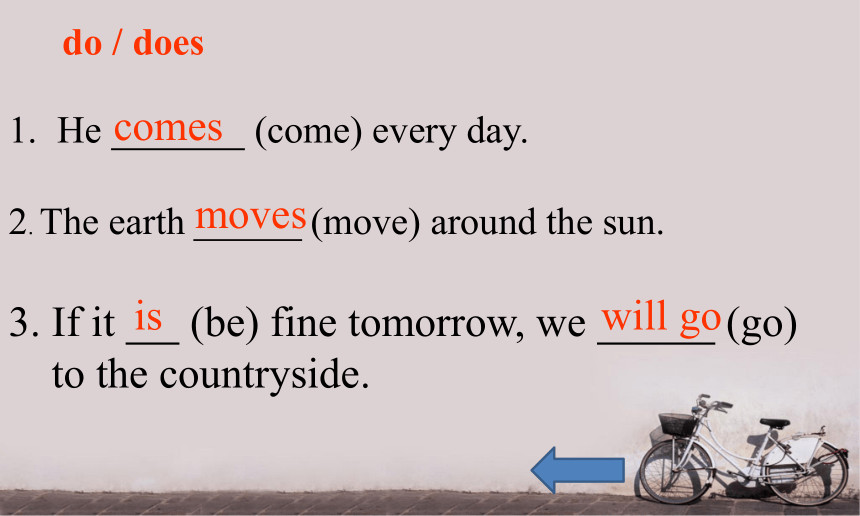
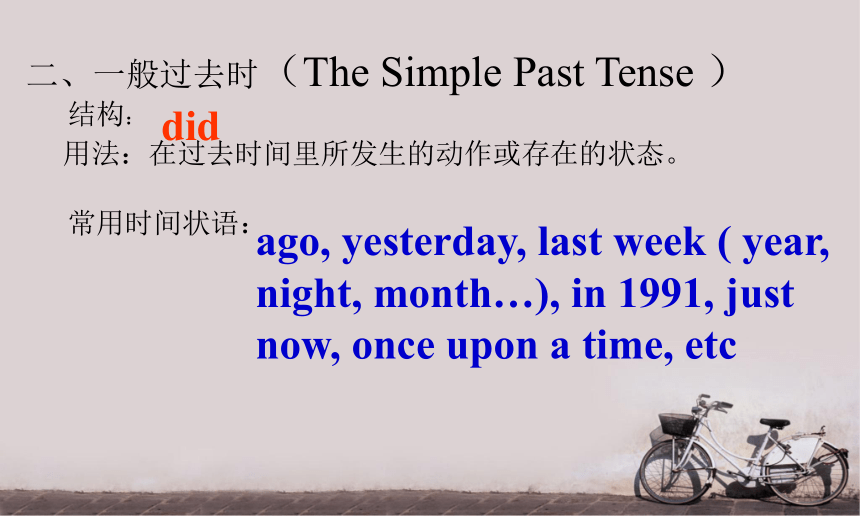
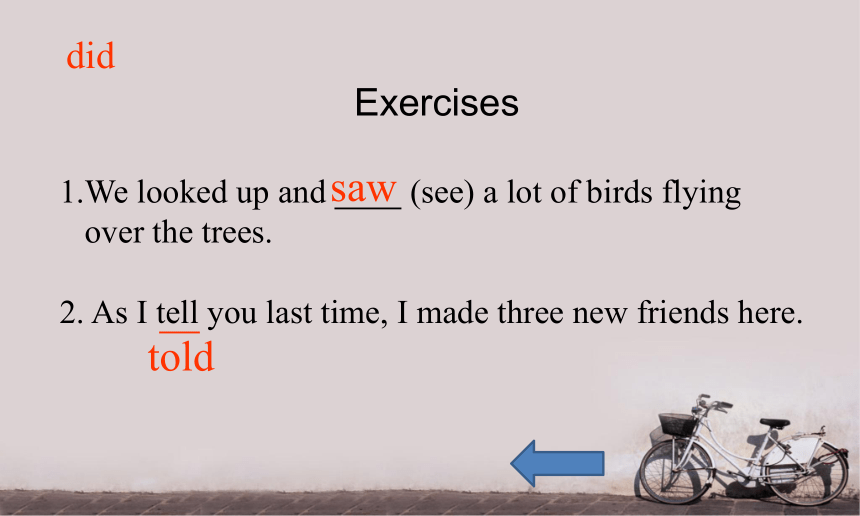
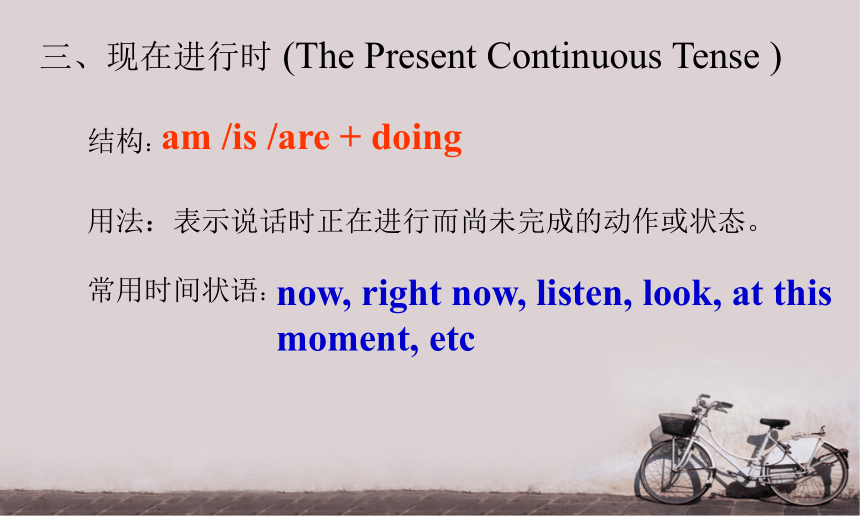
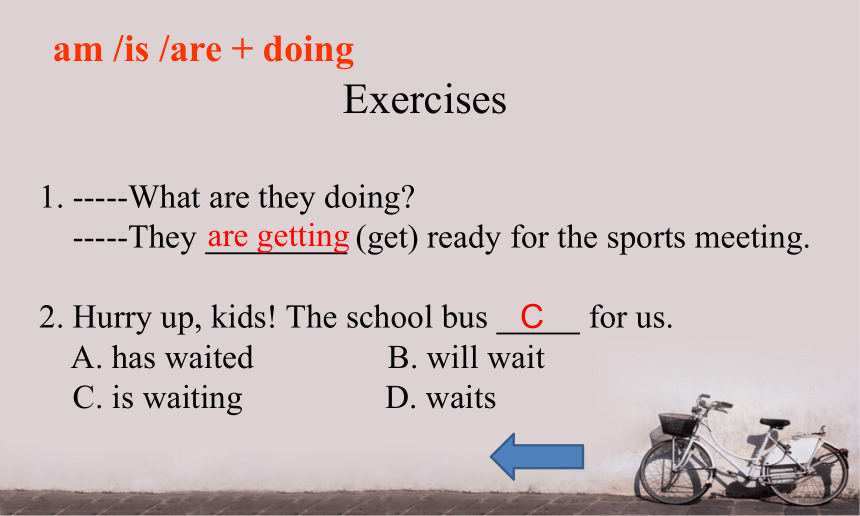
文档简介
课件29张PPT。Verb Tenses199020172067过去现在将来一般过去时
过去进行时
过去完成时
一般现在时
现在进行时
现在完成时一般将来时
过去将来时一.一般现在时(The Simple Present Tense)
结构:
1) 用法:经常性或习惯性的动作
常用时间状语:
2)客观真理,客观存在,科学事实或表示格言或警句。
3)在时间、条件、方式、让步状语从句中,用一般现
在时代替一般将来时,即主将从现。
do / does (三单)every day, always, usually,
sometimes, often, etc
He (come) every day.
2. The earth (move) around the sun.
3. If it (be) fine tomorrow, we (go)
to the countryside.
comesmovesiswill go do / does 二、一般过去时(The Simple Past Tense )
结构:
用法:在过去时间里所发生的动作或存在的状态。
常用时间状语:
didago, yesterday, last week ( year, night, month…), in 1991, just now, once upon a time, etcExercises
We looked up and (see) a lot of birds flying
over the trees.
2. As I tell you last time, I made three new friends here.
sawtolddid三、现在进行时 (The Present Continuous Tense )
结构:
用法:表示说话时正在进行而尚未完成的动作或状态。
常用时间状语:
am /is /are + doingnow, right now, listen, look, at this
moment, etcExercises
1. -----What are they doing?
-----They (get) ready for the sports meeting.
2. Hurry up, kids! The school bus for us.
A. has waited B. will wait
C. is waiting D. waits
are getting Cam /is /are + doing四、过去进行时(The Past Continuous Tense)
结构:
用法;表示过去某一时刻或某一时间段正在发生的动作。
常用时间状语:
was / were + doingat this time yesterday, when..., while..., at that moment, etc Exercises
I (read) a book when Tom called.
2. I first met Mary three years ago. She at a bookshop
at that time.
A. has worked B. was working
C. is working D. had worked was readingwas / were + doingB五、现在完成时(The Present Perfect Tense)
结构:
用法:发生在过去且对现在仍有影响的动作。
常用时间状语:
have / has + donealready, yet, never, so far, up to now, recently, since, for, in the past few years, etc
Exercises
Mary (learn) English for five years.
2. I had worked here since 2014.has learnedhavehave / has + done六、过去完成时(The Past Perfect Tense)
结构:
用法:表示过去某一时刻或某一动作之前完成的动作
或状态。
常用时间状语:
had + done by the end of last year, by, before, until, when等词引导的时间状语从句。过去现在将来过去的过去Exercises
He said that he (see) the film many times.
2. Susan her key in the office so she had to wait
until her husband home.
A. has left; comes B. left; had come
C. had left; came D. had left; would come had seen∨had + done 七、一般将来时(The Simple Future Tense )
结构:
用法:表示计划、打算、企图做某事或将来注定要发生的
事情。
常用时间状语:tomorrow, next day (week,month, year…),soon, in a few minutes, the day after tomorrow, etc.
will/ shall + do
am/ is / are going to doExercises
We (send) her a present as her birthday gift.
We (send) her a present as her birthday gift.
shall / will send are going to sendwill/ shall + do
am/ is / are going to do八、过去将来时 (The Past Future Tense)
结构:
用法:表示从过去某时看将要发生的动作或存在的状
态,常用于宾语从句中。
常用时间状语:the next day (morning, year…), the following month (week…), etcshould / would + do
was/ were going to doExercises
The boy promised he (work) hard.
I told my parents I (return) early.
would workshould / would return should / would + do
was/ were going to do
do /does
did
am/is/are+doing
was/were+doing
have/has+done
had+done
will/shall+do
am/is/are going to+do
would/should+do
was/were going to+doExercises1.
2.
3.
4.
5.
6.ExercisesI usually up at 6:00, but yesterday I up at 7:00 and tomorrow I up at 6:30. (get)
Listen! Someone (knock) at the door.
I (be) in Beijing for two years.
Mary said she (put) on the new dress the next day.getgotwill getis knockinghave beenwould put5. If it ( not rain) tomorrow, they (go)
fishing.
6. Tom (work) there since two years ago.
7. By the time I walked into the classroom, the teacher
(start) teaching.
8. I know that he (join) the army in 1990.doesn’t rain will gohas workedhad startedjoined单句改错
The teacher told that the sun rose in the east.
I will speak to him when I will see him next Sunday.
Jane is doing some cleaning this time yesterday.
riseswas单句改错
4.When I got to the station, the bus has left.
5. He said that he will see you off at the airport the next day.
hadwould6. I work on a farm in North China in the 1970s.workedJenny
Jenny (be) a foreign girl. She (come) from the United States. Look, She (draw) pictures in the living room.
Two years ago, her parents (move) to China. Jenny
didn’t have any friends, so she (feel) lonely. But now, she (have) many Chinese friends and (study) with them every day. Jenny (visit) her grandparents in the United States next month. is comesis drawingmovedfelthasstudieswill visitWriting
Write a short passage about yourself, telling us about the past, the present and the future.Assignment
过去进行时
过去完成时
一般现在时
现在进行时
现在完成时一般将来时
过去将来时一.一般现在时(The Simple Present Tense)
结构:
1) 用法:经常性或习惯性的动作
常用时间状语:
2)客观真理,客观存在,科学事实或表示格言或警句。
3)在时间、条件、方式、让步状语从句中,用一般现
在时代替一般将来时,即主将从现。
do / does (三单)every day, always, usually,
sometimes, often, etc
He (come) every day.
2. The earth (move) around the sun.
3. If it (be) fine tomorrow, we (go)
to the countryside.
comesmovesiswill go do / does 二、一般过去时(The Simple Past Tense )
结构:
用法:在过去时间里所发生的动作或存在的状态。
常用时间状语:
didago, yesterday, last week ( year, night, month…), in 1991, just now, once upon a time, etcExercises
We looked up and (see) a lot of birds flying
over the trees.
2. As I tell you last time, I made three new friends here.
sawtolddid三、现在进行时 (The Present Continuous Tense )
结构:
用法:表示说话时正在进行而尚未完成的动作或状态。
常用时间状语:
am /is /are + doingnow, right now, listen, look, at this
moment, etcExercises
1. -----What are they doing?
-----They (get) ready for the sports meeting.
2. Hurry up, kids! The school bus for us.
A. has waited B. will wait
C. is waiting D. waits
are getting Cam /is /are + doing四、过去进行时(The Past Continuous Tense)
结构:
用法;表示过去某一时刻或某一时间段正在发生的动作。
常用时间状语:
was / were + doingat this time yesterday, when..., while..., at that moment, etc Exercises
I (read) a book when Tom called.
2. I first met Mary three years ago. She at a bookshop
at that time.
A. has worked B. was working
C. is working D. had worked was readingwas / were + doingB五、现在完成时(The Present Perfect Tense)
结构:
用法:发生在过去且对现在仍有影响的动作。
常用时间状语:
have / has + donealready, yet, never, so far, up to now, recently, since, for, in the past few years, etc
Exercises
Mary (learn) English for five years.
2. I had worked here since 2014.has learnedhavehave / has + done六、过去完成时(The Past Perfect Tense)
结构:
用法:表示过去某一时刻或某一动作之前完成的动作
或状态。
常用时间状语:
had + done by the end of last year, by, before, until, when等词引导的时间状语从句。过去现在将来过去的过去Exercises
He said that he (see) the film many times.
2. Susan her key in the office so she had to wait
until her husband home.
A. has left; comes B. left; had come
C. had left; came D. had left; would come had seen∨had + done 七、一般将来时(The Simple Future Tense )
结构:
用法:表示计划、打算、企图做某事或将来注定要发生的
事情。
常用时间状语:tomorrow, next day (week,month, year…),soon, in a few minutes, the day after tomorrow, etc.
will/ shall + do
am/ is / are going to doExercises
We (send) her a present as her birthday gift.
We (send) her a present as her birthday gift.
shall / will send are going to sendwill/ shall + do
am/ is / are going to do八、过去将来时 (The Past Future Tense)
结构:
用法:表示从过去某时看将要发生的动作或存在的状
态,常用于宾语从句中。
常用时间状语:the next day (morning, year…), the following month (week…), etcshould / would + do
was/ were going to doExercises
The boy promised he (work) hard.
I told my parents I (return) early.
would workshould / would return should / would + do
was/ were going to do
do /does
did
am/is/are+doing
was/were+doing
have/has+done
had+done
will/shall+do
am/is/are going to+do
would/should+do
was/were going to+doExercises1.
2.
3.
4.
5.
6.ExercisesI usually up at 6:00, but yesterday I up at 7:00 and tomorrow I up at 6:30. (get)
Listen! Someone (knock) at the door.
I (be) in Beijing for two years.
Mary said she (put) on the new dress the next day.getgotwill getis knockinghave beenwould put5. If it ( not rain) tomorrow, they (go)
fishing.
6. Tom (work) there since two years ago.
7. By the time I walked into the classroom, the teacher
(start) teaching.
8. I know that he (join) the army in 1990.doesn’t rain will gohas workedhad startedjoined单句改错
The teacher told that the sun rose in the east.
I will speak to him when I will see him next Sunday.
Jane is doing some cleaning this time yesterday.
riseswas单句改错
4.When I got to the station, the bus has left.
5. He said that he will see you off at the airport the next day.
hadwould6. I work on a farm in North China in the 1970s.workedJenny
Jenny (be) a foreign girl. She (come) from the United States. Look, She (draw) pictures in the living room.
Two years ago, her parents (move) to China. Jenny
didn’t have any friends, so she (feel) lonely. But now, she (have) many Chinese friends and (study) with them every day. Jenny (visit) her grandparents in the United States next month. is comesis drawingmovedfelthasstudieswill visitWriting
Write a short passage about yourself, telling us about the past, the present and the future.Assignment
